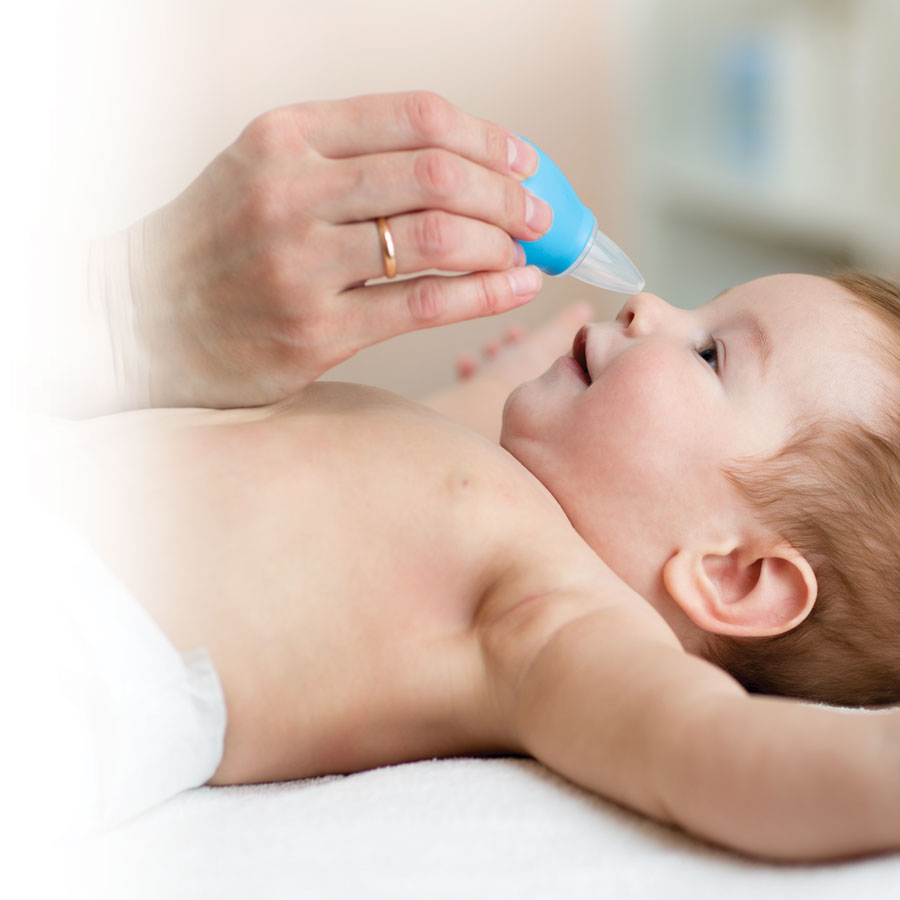Nasal congestion is a challenge for babies―and their parents! What can be done to relieve a baby’s stuffy or runny nose?
Is nasal congestion problematic in babies?
Congestion and nasal discharge are usually harmless symptoms in babies, as they are in older children and adults. The only catch is that babies are incapable of blowing their own noses or of clearly expressing their discomfort. Therefore, being congested or having a runny nose can compromise not only their well-being, but the quality of their sleep and their nutrition.
In addition to being unpleasant for babies, nasal congestion leaves parents feeling helpless in the face of their child’s discomfort. They would like to find solutions as quickly as possible and their actions are essential to manage these difficult times.
What causes nasal congestion in babies?
Nasal congestion is often caused by a viral infection, such as the common cold. It may be accompanied by a cough, runny nose, fever or sore throat. A cold usually goes away on its own within 10 to 14 days. Patience is key, as there is no curative treatment against the common cold. The baby’s immune system must fight the infection.
Although respiratory allergies are more common in older children and adults, some babies are not spared of them. Nasal symptoms are sometimes caused by an allergy to pollen, dust or animals, for instance.
More rarely, your baby may have a bacterial infection, such as sinusitis. Only a doctor can make this diagnosis. So, if you suspect your child has this type of infection, it’s preferable to see a doctor.
What medications can I give my baby for relief?
None! The over-the-counter medications formulate to ease congestion and nasal discharge, whether in oral or topical formats, are not suitable for babies. Moreover, their use is not recommended.
If the cause of symptoms warrants the use of medication, it must absolutely be recommended by a healthcare professional, such as a doctor. Never give your baby medication (whether or not it is prescribed) without prior medical approval.
What else can I do to provide my baby with relief?
Saline solutions (salt water) are the best nasal hygiene option to relieve congestion, as they are both safe and effective. A product formulated at a very specific concentration must be used. You can prepare a home-made formula by closely following a recipe using boiled water and administering it with a syringe.
You can also purchase commercial formulations at the pharmacy. For children under the age of two, it is preferable to use products with a dropper. Sprays and nasal irrigation bottles are generally more suitable for older children.
You may consider aspirating secretions using a nasal aspirator or pump. Whatever the products you would like to purchase, be sure to speak to your pharmacist, who will help you choose the best-suited products and tell you how to use them, according to your child’s age.
Additionally, make sure your child drinks plenty of water, so they remain well hydrated. Regularly offer them milk or water. Be sure to shower them with comfort as well! You are the best-suited person to know what calms them. Focus on the winning formulas (rocking, soft music or singing, sleeping in Daddy or Mommy’s arms, etc.).
What can I do to prevent nasal congestion?
In order to avoid your child catching a virus and being indisposed by a cold, the best medicine is prevention. The viruses that cause respiratory infections are very contagious and can spread by contact with airborne droplets (for instance, through sneezing or coughing) or contaminated objects. Babies like to touch everything and to put things in their mouths. This predisposes them to infections.
Here is some advice to reduce the risks of infection:
- Wash your hands often, especially before hugging or providing care to your baby.
- Disinfect surfaces or objects likely to be contaminated by germs.
- Limit close contact between your baby and infected persons. It may be better to postpone a visit to friends or family if you know that they have a cold.
When should I see a doctor?
If your baby is under three months old and is congested, it is advisable to see a doctor immediately. Before the age of three months, babies breathe only through the nose, so nasal congestion is a real problem.
Beyond this age, nasal congestion shouldn’t be a cause for concern. However, it is recommended to see a doctor promptly in the following situations:
- nasal congestion or nasal discharge lasting more than 10 days
- a high fever (temperature over 39°C or 102°F)
- difficulty breathing, swallowing or eating
- refusing to drink or eat
- unusual breathing (e.g., wheezing or rapid breathing)
- thick or coloured secretions
- persistent cough
- acute regurgitation, vomiting or choking
- other unusual or worrisome symptoms (difficulty waking up, drowsiness, rash, etc.)
If you have any doubts or health-related concerns regarding your child, remember that you can also ask for advice from professionals at Info Santé and your pharmacist.

